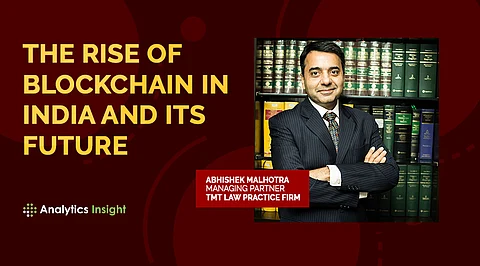
- Insights
- Cryptocurrencies
- Stocks
- White Papers
- Industry
- Geography
- Insights
- Cryptocurrencies
- Stocks
- White Papers
- Industry
- Geography


The 21st century has witnessed unparalleled technological advancement, especially in terms of information technology. The technological advancement is significantly felt in the latest discussions around artificial intelligence, machine learning, blockchain, and everything else that relies on it. With the advent of blockchain, the "fad" is catching up with respect to the currencies germinating from it, the underlying technology which affords transparency and immutability. From what is available in public knowledge, the investment made by Indians in cryptocurrencies alone is upwards of USD 10 billion. Barring that, we also see that the use of the underlying blockchain technology has found the most takers in the banking and financial sector. Also, the fact that the Indian government is actively using this for land title registry, vehicle lifecycle management, farm insurance, and electronic health record management, says a lot as to the awareness, willingness, and pace at which blockchain is aimed being imbibed into the social, economic fabric of the country.
From the private sector viewpoint, various companies are exploring blockchain to improve effectiveness, and are trying to internally revisit their processes and workflows to add value to their service delivery systems. 56% of Indian businesses are moving towards blockchain technology, making it a part of their core business. The National Informatics Centre has established a Centre of Excellence (CoE) in Blockchain Technology which operates as a coordinated, interoperable blockchain ecosystem around the nation. This allows the government to test run projects before rolling them out for public interfaces.
The boost that was needed from a regulatory standpoint, has been warranted in a limited fashion when NITI AAYOG in its strategy paper on blockchain covered the fundamentals of distributed technology, its potential framework, the challenges, and lessons from NITI AAYOG's own Proofs of Concept, its use cases, and suggestions for India's national blockchain strategy. As per the premier think tank in the country, it is required of the respective governments to provide special attention to localized networks wherever peer-to-peer transactions can build additional socio-economic worth.
The Securities and Exchange Board of India (SEBI) asked depositories to create, host, and maintain a system using distributed ledger technology (DLT), or blockchain technology, to record and monitor the creation of securities as well as to monitor the covenants of non-convertible securities. This system comes into effect from April 1, 2022. As the case has been with the BFSI sector, it stands in as the forerunner in the adoption and implementation of blockchain technology as well. With the banking and healthcare regulators willing to afford regulatory sandboxes, it is not incorrect to assume that a lot of the participating stakeholders will wish to participate in the same, by deploying blockchain technology at some level or the other.
Additionally, in December, last year, the Ministry of Electronics and Information Technology ("MeitY") released a National Strategy on Blockchain (Strategy) seeking to adopt technology in government systems, especially for e-governance purposes, and offering blockchain as a service. The Strategy further requires state government to develop state-specific blockchain applications on the shared blockchain infrastructure. As per the Strategy, various Government organizations and other stakeholders will work in harmony to the advantage of the blockchain technology in terms of enhanced security, trust, and its ability to ensure tamper-evident transactions. MeitY has projected a roadmap that includes the assessment of the value proposition of blockchain technology, running pilot deployments, and prototypes, evaluating these for specific platforms and in the future, adopting them for other applications and areas. MeitY has also identified five areas of weakness in the technology – scalability, security, interoperability, data localization, and disposal of records.
As per a report by digital asset exchange Cross Tower and US-India Strategic Par Partnership Forum, blockchain technology, and Web 3.0 innovations will propel the digital asset economy's value from $5 billion in 2021 to $262 billion over an 11-year period, resulting in a $1.1 trillion contribution to India's GDP. Such is the impact of blockchain technology! Blockchain has remarkable growth potential for India, especially since the implementation requires software people, financial experts as well as legal acumen, in turn creating job opportunities. Blockchain technology is going to revolutionize the functionality of B2B, G2C, G2G, B2G services corresponding to various application domains. Its implementation can be reflected in healthcare, governance, cyber security, automobiles, media, travel, logistics & hospitality, education, legal, energy. The materialization of blockchain technology also holds promise for the Government to harbor transparency and accountability and provide frictionless transactions with the citizens.
While some suspect that the adoption of this technology is going to erode the legacy systems, what it truly poses to do is to act as the catalyst to revamp the existing processes, by bringing in efficiency and greater value. With the immutability, transparency, and decentralized approaches that the technology affords, it is also going to add more value and is capable of bringing in more trust into the ecosystem it flourishes in. This also adds and assists from the point of view of business continuity, and disaster recovery management, by allowing access to the information stored on the other nodes, across different locations.
Abhishek Malhotra, Managing Partner, TMT Law Practice Firm
